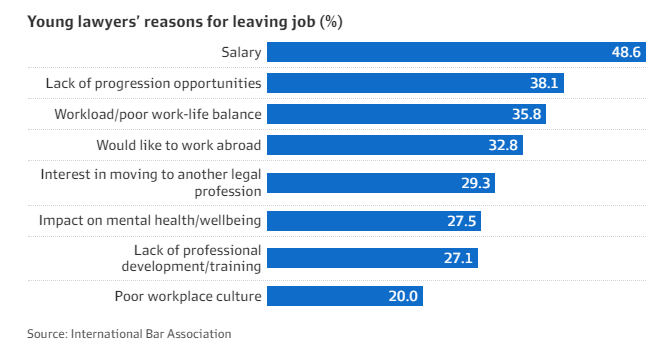INTERNATIONAL 05/02/2022
New IBA Report Reveals Significant Numbers Of Young Lawyers Want To Leave Their Current Job

Most young lawyers around the world say they will probably leave their employer in the next five years, with salary the key determinant of whether they want to exit their current role or take a new offer, a survey by the International Bar Association has revealed.
Fifty-four per cent of respondents to the survey said they would probably move to a new but comparable workplace in that period, and 33 per cent said they would move to a new legal role. A fifth said they may leave the profession entirely.
The wide-reaching study comes as the legal industry suffers crippling skills shortages of early- to mid-career lawyers, with staff leaving their roles for career changes, the lure of overseas work or better offers at rival firms.
The survey covered more than 3000 lawyers aged 40 or younger, including 200 Australians.
More than 90 per cent of industry leaders cite skills shortages as their biggest challenge going into this year, the latest Law Partnership Survey from The Australian Financial Review revealed, as they are forced to reject work and engage in salary wars that bite into their bottom line.
Almost half of the young lawyers who told the IBA they would probably leave their current roles cited salary as the most significant reason.
Workplace culture an issue
Workplace culture concerns also rated highly, with work-life balance cited as a major push factor by more than 60 per cent of young lawyers, and 71 per cent of those aged 25 or younger.

“Expecting an associate to bill over 2000 hours and also regularly attend networking events to build profile or reach new clients is unrealistic,” one male respondent said.
The legal young guns also pointed to toxic workplace cultures as a factor driving them away from the legal industry, with women and lawyers in their early 20s showing more concern about a failure to address such issues than men and those in their late 30s.
Women also consistently reported more barriers to their career progression than men, including direct discrimination, a lack of mentorship and guidance, poor on-the-job assistance, and struggles to balance commitments.
“The profession is too conservative and older lawyers don’t understand the concept of active mentorship despite several conversations on the topic,” one female respondent said.
Career options
Other factors pushing young lawyers out of their jobs included a desire to work abroad, concern about work damaging their mental health and wellbeing, and interest in other professions within the legal industry.
The IBA report called for more proactive policies around work-life balance at firms, and for employers to set up structures that protected juniors from unreasonable hours at least some of the time.
“Working long or anti-social hours is a key feature of working in the legal profession, and no firm or institution can be expected to promise young lawyers that they will never be subject to periods of intense demand upon their time,” the report said.
“[But] younger lawyers in particular need shielding from the unreasonable demands of clients or senior figures within firms, who may rob younger lawyers of the chance to work a realistic or healthy number of hours in a way that can often be indistinguishable from bullying in the workplace.”
In terms of pull factors to a new role, more than 70 per cent of respondents said salary was an “attractive” reason to move.
More than half said they were drawn to workplaces that promoted a healthy work-life balance, 34.8 per cent wanted more variety in work, and 32 per cent wanted overseas travel opportunities.
The young lawyers said they also looked at staff retention rates, professional development support and flexible work options when considering new employers.



